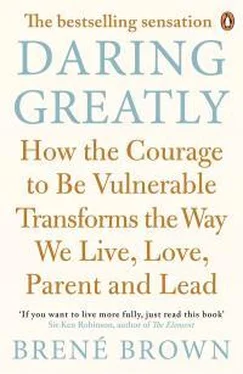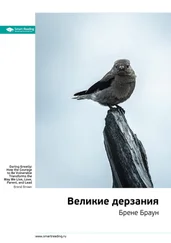When I lose this weight
If I get accepted into this school
If my wife’s not cheating
If we don’t get divorced
If I get promoted
When I get pregnant
When he asks me out
When we buy a house in this neighborhood
If no one finds out
Shame loves prerequisites. Our if/when worthiness list easily doubles as the gremlins’ to-do list. Don’t let her forget that her mom thinks she should lose that baby weight. Remind him that his new boss only respects guys with MBAs. Poke her if she forgets that all of her friends made partner last year.
As parents, we help our children develop shame resilience and worthiness by staying very mindful about the prerequisites that we’re knowingly or unknowingly handing down to them. Are we sending them overt or covert messages about what makes them more and less lovable? Or are we focusing on behaviors that need to change and making it clear that their essential worthiness is not on the table? I often tell parents that some of the most destructive covert messages that we send our children stem from the feminine and masculine norms that we discussed in Chapter 3. Are we overtly or covertly telling our daughters that thin, nice, and modest are prerequisites for worthiness? Are we teaching our girls to respect boys as tender and loving beings? Are we sending messages to our sons that we expect them to be emotionally stoic, to put money and status first, and to be aggressive? Are we teaching our sons to respect women and girls as smart and capable people, not objects?
Perfectionism is another fount of prerequisites. In a dozen years of studying worthiness, I’m convinced that perfectionism is actually contagious. If we struggle with being, living, and looking absolutely perfect, we might as well line our children up and slip those little perfection straitjackets right over their heads. Just as a reminder from Chapter 4, perfectionism is not teaching them how to strive for excellence or be their best selves. Perfectionism is teaching them to value what other people think over what they think or how they feel. It’s teaching them to perform, please, and prove. Unfortunately, I have many examples from my own life.
For instance, when Ellen got her first tardy at school, she immediately broke down crying. She was so upset about breaking the rules and upsetting her teacher or the principal that she just fell apart. We kept telling her that it wasn’t a big deal and that everyone is late sometimes until she felt better. That evening we celebrated surviving our first tardy with a little “tardy party” after dinner. She finally agreed that it wasn’t a big deal and that other people probably didn’t judge her for being human.
Fast-forward four days to Sunday morning. We’re running late for church and I’m in tears. “Why can’t we ever get out of here on time! We’re going to be late!” Ellen looked up at me and earnestly asked, “Dad and Charlie will be here in one minute. Are we missing something important?” Without hesitating, I said, “No! I just hate walking in late and sneaking down the aisle. It’s the 9 o’clock service, not the 9:05 service.” She looked confused for a second, then grinned as she said, “It’s not a big deal. Everyone’s late sometimes. Remember? I’ll throw a tardy party for you when we get home.”
Sometimes prerequisites and perfectionism are handed down in very subtle ways. One of the very best pieces of parenting advice that I ever received was from the writer Toni Morrison. It was May of 2000 and Ellen was just shy of her first birthday. Ms. Morrison was on Oprah talking about her book The Bluest Eye . Oprah said, “Toni says a beautiful thing about the messages that we get about who we are when a child first walks into a room,” and she asked Ms. Morrison to talk about it.
Ms. Morrison explained that it’s interesting to watch what happens when a child walks into a room. She asked, “Does your face light up?” She explained, “When my children used to walk in the room when they were little, I looked at them to see if they had buckled their trousers or if their hair was combed or if their socks were up. … You think your affection and your deep love is on display because you’re caring for them. It’s not. When they see you, they see the critical face. What’s wrong now? ” Her advice was simple, but paradigm-shifting for me. She said, “Let your face speak what’s in your heart. When they walk in the room my face says I’m glad to see them. It’s just as small as that, you see?”
I literally think about that advice every day—it’s become a practice. When Ellen comes bounding down the stairs dressed for school, I don’t want my first comment to be “Pull your hair back” or “Those shoes don’t match your dress.” I want my face to convey how happy I am to see her—to be with her. When Charlie comes in the back door and he’s sweaty and dirty from catching lizards, I want to flash a smile before I say, “Don’t touch anything until you wash your hands.” So often we think that we earn parenting points by being critical, put out, and exasperated. Those first looks can be prerequisites or worthiness-builders. I don’t want to criticize when my kids walk in the room, I want to light up!
In addition to keeping a mindful eye on prerequisites and perfectionism, we can help our children keep and cultivate their sense of worthiness in another way, one that relates back to what we learned about the differences between shame and guilt. Research indicates that parenting is a primary predictor of how prone our children will be to shame or guilt. In other words, we have a lot of influence over how our kids think about themselves and their struggles. Knowing as we do that shame is positively correlated with addiction, depression, aggression, violence, eating disorders, and suicide, and that guilt is inversely correlated with these outcomes, we naturally would want to raise children who use more guilt self-talk than shame.
This means we need to separate our children from their behaviors. As it turns out, there’s a significant difference between you are bad and you did something bad . And, no, it’s not just semantics. Shame corrodes the part of us that believes we can do and be better. When we shame and label our children, we take away their opportunity to grow and try on new behaviors. If a child tells a lie, she can change that behavior. If she is a liar —where’s the potential for change in that?
Cultivating more guilt self-talk and less shame self-talk requires rethinking how we discipline and talk to our children. But it also means explaining these concepts to our kids. Children are very receptive to talking about shame if we’re willing to do it. By the time they’re four and five, we can explain to them the difference between guilt and shame, and how much we love them even when they make bad choices.
When Ellen was in kindergarten, her teacher called me at home one afternoon and said, “I totally get what you do now.”
When I asked her why, she said that earlier in the week, she had looked over at Ellen, who was in the “Glitter Center” and said, “Ellen! You’re a mess.” Apparently, Ellen got a very serious look on her face and said, “I may be making a mess, but I’m not a mess.” (That’s the day I became “that parent.”)
Charlie also gets the distinction between shame and guilt. When I found our dog pulling food out of the trash can, I scolded her by saying, “Bad girl!” Charlie came sliding around the corner, shouting, “Daisy is a good girl who made a bad choice! We love her! We just don’t love her choices!”
When I tried to explain the difference by saying, “Daisy is a dog, Charlie,” his response was, “Oh, I see. Daisy is a good dog who made a bad choice.”
Читать дальше






![Брене Браун - Вопреки. Как оставаться собой, когда всё против тебя [litres]](/books/436389/brene-braun-vopreki-kak-ostavatsya-soboj-kogda-v-thumb.webp)





